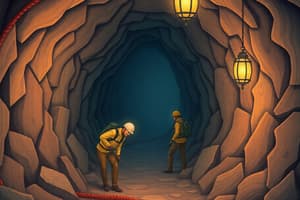Podcast
Questions and Answers
A confined space meets which of the following conditions?
A confined space meets which of the following conditions?
- Has limited entry and exit
- Is not designed for continuous occupancy
- Is large enough for a person to enter
- All of the above (correct)
Which of the following would be an example of non-entry rescue?
Which of the following would be an example of non-entry rescue?
A retrieval line hooked to an entrant in a permit space.
Authorized entrants must do which of the following?
Authorized entrants must do which of the following?
- Remain aware of their surroundings
- Communicate with the attendant
- Follow safety procedures
- All of the above (correct)
Which of the following would constitute a permit-required space?
Which of the following would constitute a permit-required space?
The _____ is responsible for maintaining an accurate count of authorized entrants in a permit space.
The _____ is responsible for maintaining an accurate count of authorized entrants in a permit space.
A ______ employer is the employer that owns or manages the property where the construction work is taking place.
A ______ employer is the employer that owns or manages the property where the construction work is taking place.
____ refers to a ____ hazard in which liquids or loose materials that can behave like a liquid draw a worker into their flow.
____ refers to a ____ hazard in which liquids or loose materials that can behave like a liquid draw a worker into their flow.
Flashcards are hidden until you start studying
Study Notes
Confined Spaces Overview
- A confined space must meet specific conditions to be classified as such.
- Conditions for a confined space include limited openings for entry and exit and not intended for continuous occupancy.
Non-Entry Rescue
- Non-entry rescue involves methods that do not require a rescuer to enter a confined space.
- An example includes using a retrieval line connected to a worker inside a permit-required space.
Responsibilities of Authorized Entrants
- Authorized entrants must adhere to specific safety practices and protocols before and during entry into a confined space.
- Key responsibilities include monitoring atmospheric conditions and communicating issues with attendants.
Permit-Required Confined Spaces
- In addition to confined space conditions, a permit-required space must contain or potentially contain a hazardous atmosphere.
- Hazardous atmospheres may include toxic gases, lack of oxygen, or flammable vapors.
Role of the Attendant
- The attendant plays a vital role in confined space operations by maintaining an accurate count of authorized entrants.
- It is crucial for the attendant to be aware of the number of people inside the space for safety and compliance.
Host Employer Responsibilities
- The host employer is the entity that owns or controls the property where construction takes place.
- Responsibilities include ensuring safety measures are followed and that contractors are aware of potential hazards on the site.
Engulfment Hazards
- Engulfment refers to physical hazards where workers may be enveloped by liquids or loose materials acting like a liquid.
- This can lead to asphyxiation and other serious injuries, highlighting the need for proper safety protocols in specific environments.
Studying That Suits You
Use AI to generate personalized quizzes and flashcards to suit your learning preferences.




